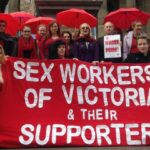The Legal Status of Sex Work Across Australia

The Queensland government has announced it will implement a decriminalised model of sex work, following a series of recommendations from the Queensland Law Reform Commission.
The legal status of sex work varies throughout Australia, ranging from areas of significant criminalisation to full decriminalisation of sex work.
Here’s what you need to know.
Terminology
- Sex work (or “prostitution”): although definitions vary in each State and Territory, generally “sex work” refers to a commercial arrangement where sexual services are provided in exchange for payment or reward.
- Brothel: refers to a premises from which sex work is provided. Brothel operators take a percentage of sex worker earnings for services provided on the premises.
- Escort agency: refers to a premises (or business) used to arrange contacts between sex workers and clients. Escort agency operators will charge a fee or take a percentage of sex worker earning for providing this service. A sex worker who utilises an escort agency is called an “escort”.
- Private sex work (or “private escorting”): where sex workers operate independently arranging their own contacts with clients without utilising a brothel. Private sex work can be further subdivided into “in-calls” where clients visit a premises arranged by the sex worker (such as their residence or a hotel/motel) and “out-calls” where a sex worker visits a premises arranged by the client.
- Street-based sex work: where sex workers meet clients in a public place. Street-based sex workers and their clients are often at risk of being charged with “solicitation” – an offence encompassing the seeking or asking for sexual services in a public place.
Models of Sex Work
Sex worker activists and their critics will often refer to different models for the regulation of sex work. Whilst sometimes these models can simplify differences between jurisdictions using the same model, they are often useful short-hand.
The following are the most commonly cited models of sex work:
- A fully criminalised model, which means that sex workers, their clients as well as brothel and escort agency operators all could be charged with offences relating to sex work. Much of the world operates under a fully criminalised model of sex work.
- A neo-abolitionist or partially criminalised model (also known as the “Swedish model” or “Nordic model”) means that the provision of sex work services, in itself, isn’t criminalised but clients who purchase sexual services as well as people living on the earnings of sex workers (such as a brothel or escort agency operator) are criminalised. This model has been implemented, in varying degrees in Sweden, Norway, Iceland, Canada, Northern Ireland, Ireland, France and Israel.
- A legalisation or licensing model where all facets of sex work are legal including private sex work and the operation of brothels and/or escort agencies, but only if sex work specific laws and regulations are followed, such as being licensed by a regulatory authority. If sex work specific laws and regulations aren’t followed, these activities are criminalised and police are used to regulate the “illegal” components of the industry.
- A decriminalised model where there are no sex work specific criminal or licensing laws, and all facets of sex work are fully decriminalised. Under this model sex work is regulated like any other business.
Under all models of sex work, criminal laws relating to sex trafficking, sexual slavery and child prostitution still apply.
Sex Work Laws in NSW
New South Wales operates under a decriminalised model of sex work, becoming the first jurisdiction in the world to implement this regulatory approach.
All types of sex work are decriminalised in NSW, including sex work provided in brothels, arranged by escort agencies as well as both in-call and out-call private sex work. Sex workers are protected by the same occupational health and safety laws as any other worker.
The location of sex work premises, such as brothels, are regulated by local councils.
Street-based sex work is mostly decriminalised, but restricted to certain areas. Solicitation must not occur near or within view of a dwelling, school, church or hospital.
Sex Work Laws in Queensland
Currently, Queensland operates under a legalisation or licensing model of sex work.
Brothel operators must obtain a license from the Prostitution Licensing Authority in order to operate. Working in an unlicensed brothel is a criminal offence.
Although private sex work is legal, sex work specific laws and regulations severely limit how sex workers can provide their services. Escort agencies, massage parlour work, street-based sex work and private workers providing services in pairs or small groups are all criminalised.
Street-based sex work is also largely criminalised.
The Queensland Law Reform Commission found that the licensing model of sex work was putting sex workers at risk and creating a “two-tiered” system where much of the industry remained criminalised in the state. It recommended a decriminalised model of sex work be implemented.
Sex Work Laws in the ACT
The ACT largely operates under a legalisation or licensing model of sex work.
Private sex work, including in-calls and out-calls, can be legally provided in the ACT without the need to obtain a license or register.
Both brothels and escort agencies must be registered with Access Canberra. Brothels must also only operate in “approved locations” – meaning they can only legally operate in Fyshwick or Mitchell. It is illegal to operate an unregistered brothel or escort agency, or operate a brothel outside an approved location.
Street-based sex work is largely criminalised.
Sex Work Laws in Victoria
Victoria moved from a legalisation or licensing model of sex work to a decriminalised model of sex work in 2022. Some of these reforms have not fully come into effect, but will do so at the end of this year.
Once in full effect, all types of sex work will be decriminalised in Victoria, including sex work provided in brothels, arranged by escort agencies as well as both in-call and out-call private sex work. Sex workers are protected by the same occupational health and safety laws as any other worker.
The location of sex work premises is regulated by local councils.
Street-based sex work is mostly decriminalised, but restricted to certain areas and times. Street-based sex workers must not work at or near a places of worship, schools, children’s services or education and care services between 6am and 7pm. The prohibition of working near places of worship includes outside these hours on specific days of religious significance.
Sex Work Laws in South Australia
Although laws are very vague and inconsistently enforced, in general, sex work is largely criminalised in South Australia.
Offences apply to “keeping and managing” brothels as well as “permitting premises to be used” as brothels – with the term “brothel” likely encompassing both brothel operators as well as premises used by private sex workers (whether providing in-call or out-call services).
Although not explicitly prohibited, the legal status of escort agencies in South Australia is unclear.
Street-based sex work is criminalised.
Sex Work Laws in the Northern Territory
The Northern Territory moved from a legalisation or licensing model of sex work to a decriminalised model in 2019.
All types of sex work are decriminalised in NT, including sex work provided in brothels, arranged by escort agencies as well as both in-call and out-call private sex work. Sex workers are protected by the same occupational health and safety laws as any other worker.
The location of sex work premises is regulated by local councils. Owners and managers of sex services businesses with three or more sex workers must obtain a suitability certificate from the Commissioner of Consumer Affairs.
There are no specific laws on street-based sex work, meaning it is fully decriminalised.
Sex Work Laws in Western Australia
Laws regarding sex work in the WA are vague and inconsistently enforced.
There are no criminal laws prohibiting private sex work in WA but there are a number of sex work specific offences applying to associated activities.
Keeping, maintaining, managing, or permitting a premises to be used for sex work, whether as an owner, operator, tenant or landlord is a criminal offence in WA meaning that brothels are not permitted. The legal status of escort agencies is unclear.
Street-based sex work is largely criminalised.
Sex Work Laws in Tasmania
Laws regarding sex work in Tasmania distinguish between “sexual services businesses” where one or two private sex workers operate and “commercial sexual services businesses” where an operator supervises or manages sex workers.
Under this scheme, “sexual services businesses” or private sex work is legal, but “commercial sexual services businesses” or brothels and escort agencies are criminalised.
Street-based sex work is largely criminalised.






